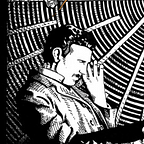There is a black and white photo of El Capitolio on the wall of Abuelo’s house.
Its icy frame catches the golden dust in the kitchen air, appearing
pardo. There is no such term in English. He tells me of the colors
like a dream. Suddenly, I am ten again, learning Spanish and shame,
drowning. He asks me, what’s wrong, as I struggle through my very first
foreign language assignment. In Spanish there are two verbs that
in English are both glossed as to know. The primary distinction is
whether the knowledge is a matter of fact or familiarity. In English,
to know is often used to indicate agreement rather than knowledge.
We sit at this same table, an asymmetric pentagon with a long arm,
he built himself. When I cannot translate a sentence about Cuba,
he says I must try harder, and I want so badly to explain why I am
confused, but my tongue will not cooperate. It, frozen in its complete
inability to decide whether knowledge of our people is propositional
or personal, betrays me. I have no answer more than I know. Now,
over coffee we talk politics. Or rather, we don’t. Hand held firmly around
the handle of a discolored mug, he brings the boiling black to his lips.
Mine, with cream, still burns my tongue. I stir in more, captured
by the contagion it casts. Curious, how just a drop renders the whole
of it white. He calls me back by name. Mine and his. It sits between us,
a vast and thrashing ocean. At this angle, El Trabajo and La Virtud Tutelar
perch on his shoulders. I apologize, lost in the current’s revolution,
and ask about our family. There are relatives he insists he can’t remember,
but I know them. He reminds me history has scattered us: exiles,
immigrants, Americans, those who stayed to support, to watch the house,
those who couldn’t get out. The ocean seems obvious, but I do not think
he can see how we have each become an island in our unfamiliarity.
We cannot agree. It is far too personal. We are too far left, or right.
We do not have all of our rights left. No one is right. We left. I can see
his skin crawl at the thought of Cold War. His blood boils. His face is twisted
as he toils to bite his tongue. He tells me to forget it. It’s in the past.
And he holds the coffee closer as he softly recalls childhood visits. In Spanish,
there are two verb tenses that in English are considered the past.
The difference is a matter of interior composition. I dream of filling us
whole. I imagine an old home bright in the glow of dusk, lechón roasting
the thick air and dancing. But his skin is so thin, I fear the mere proposition
would hurt him. Whether what is described is viewed as discrete and over,
or as ongoing and indefinite is irrelevant in English. The past is simply
the past: a matter of fact. Spanish requires deciding if the past is living,
if it is as it was, if it is sustained and continued. Knowledge of the past
must also be personal or propositional. This is how history is fragmented,
how memory becomes reality. In the photo there is a curvesome Buick
Roadmaster parked along the palm trees of El Paseo. They do not manufacture
these cars anymore, but I know it still runs. Though I can scarcely describe
the view in Spanish, I am sure that I know the colors. By now the coffee
has cooled, and I try to unlearn this silence. I know that we all dream
the same dream differently. Yes, it is a matter of fact. We can never return
to the Cuba that we left because our familiar imagining is not right.
But I don’t know how to say it. Not to him. Abuelo tells me he is cold.
I wish I could give him back this name I am burning in. He is a friolero.
English does not have a word. The term Cold War suggests conflict
without violence. It says without saying. It does and denies. And I still do
not have a way to tell him what’s wrong because there is a revolution
of memory between each generation. Though it is the past, I know it is not
over since I am still drowning. I cannot forget language is an ocean.
We are its islands, and not everything translates.
Robert Américo Esnard was born and raised in the Bronx, New York. He studied Linguistics & Cognitive Science at Dartmouth College with a focus on the psycho-semantic relationship between memory and metaphor. This fascination with semiotics motivates his work as a poet and a dramatist. His poems have appeared in Glass and Lunch Ticket, as well as several anthologies.
